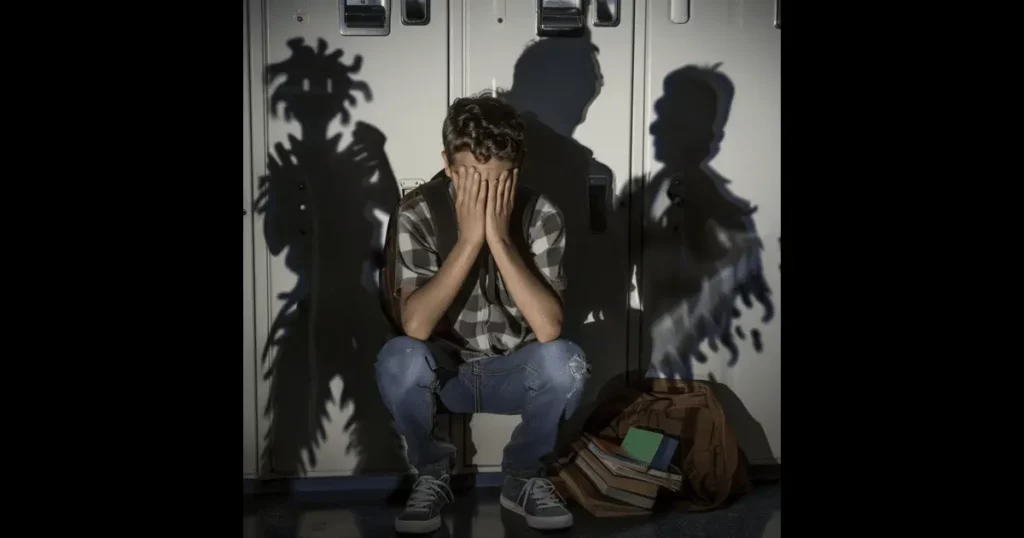
Teenage distress has become one of the significant challenges for parents nowadays. Parents often wonder about their children’s well-being, as they frequently experience anxiety and worry. Despite their seeming innocence, teenagers often struggle with anxiety and depression.
Therefore, rising anxiety, identity uncertainty, sadness, despair, distress, fear, stress, academic and family issues, school bullying, cyber addictions, and depression lead most of them to a point of no return; in some cases, this teenage distress leads them to commit suicide.
From Star Athlete to Tragedy: A Tale of Teenage Distress
Follwoing is the alarming story for both parents and kids dealing with teenage distress:
“Emanuel was a 16-year-old guy, filled with exuberance; his presence always pleased the surroundings. His sparkling eyes showed his brilliance; his healthy hair, strong arms, suitable physique and chiseled masculine jawline let him shine. As the captain of the baseball team at school, he successfully maintained all his natural attributes.
Ever since returning from his vacations, he has sounded dull and dumb. He spent most of his time in the library or room. He had quit playing, laughing, and exercising; to worsen the situation, he had started taking drugs.
Eventually, they found him dead on a quiet Friday evening in the autumn. He swallowed poison, and his sudden demise deserted the school.
His parents, standing next to his coffin, shed tears and sadly told their relatives about their unadjustable behavior with their son, the stress they put on him, the warnings they restricted his freedom with tough conditions, and the stress they put on him to score better grades, which resulted in his unexpected departure from the world.”
They had nothing but the regrets to repent of.
Parents’ Troubles: Confronting Teenage Distress
Those who bravely confront teenage distress, embrace its challenges, and overcome them are considered the most resilient. Conversely, life can either become an insurmountable obstacle or a challenge for them.
Difficulties
Parenting difficulties and teenage distress frequently throw parents and children off balance and vice versa, severely distorting both. Hence, propelling them ocassionally into an arena where an agitated bull awaits, ready to fight and toss them around again.
Challenges
Suicide is the fourth leading cause of death among 15 to 29 years old.
The WHO report,
The need for a psychiatrist in the United States has multiplied four times more than it did in the past. According to CNBC, 47 psychiatrists were available for 100,000 teenagers in 2020, with the need increasing up to four times more in the following year, 2021.
Severity in Behavior
Ever since, the shortage of clinicians is a clear indication that the severity of life-ending activity in terms of suicidal behavior has accelerated at a rapid pace in teenagers, which is alarming.
A Wake Up Call: It is in the News
57% of girls in America suffer from teenage distress.
CBS Evening News
The suicide attempts among girls between 12 and 17 in 2021 jumped to 51%.
CNBC News
Having seen this news, it is time for parents to sense the threat. There is a dire need for parents to address those problems, which leads their teenage kids to bid farewell to their lives.
Here are some facts that illustrate how teenagers feel regarding the changes they encounter.
Teenagers Deal with Physical and Emotional Changes
Salman Asif Siddiqui, director and founder of ERDC, is an educational psychologist and parent counselor. A well-known individual discusses how teenagers respond, react, expect, and behave during their adolescence.

Changes During Teenage Growth
Since, teenagers not only undergo physical growth, but also experience psychological and mental development. They are in a stage of life where they experience emotions more intensely and strongly, rather than as easily as they did during their childhood.
Although, the memories from this age shape their personalities, their lack of emotional maturity prevents them from reacting appropriately. But whatever happens or what they experience as teenagers remains printed in their memory for the rest of their lives. This shade of happenings does not fade away ever, and thus their impact lasts forever and often throws them into teenage distress.
Need for Love
Teenagers are less expressive towards their parents; they desire more of their parents’ love, just as they did when they were very young, but in some cases, as they grow, they become less expressive and don’t convey this desire.
Styling Sense and their Looks
Teenagers start to worry more about how they appear. They now have to spend a lot of time outside and are more interested in observing the surrounding environment. Further more, they are concerned with how they look. Social media may have influenced this sensation.
Friends’ Opinions Matter
Teenagers prioritize the trends their friends follow; they pay more attention to their peer opinions than their parents and are often more sensitive to what their friends think about them, and they behave according to them.
Academic Fears Leads to Teenage Distress
They constantly fear receiving low grades or failing exams, which contributes to their cognitive decline. The fear of achieving high grades plagues them, leading to a noticeable annual dropout rate. They understand that their parents only find satisfaction in their higher educational achievements.
Further more, various surveys reveal that teenagers in the US are vulnerable to teenage distress and other severe issues, such as drug use like marijuana and alcohol, cyberbullying by their peers, and exposure to gangs in educational institutions, which affect both girls and boys.
Social Media Drawbacks: Impact of Internet
This is the era of social media, its uses, and its misuse. Social media has modified the way teens date. Research proves it can affect their mental health. Regardless of the precautions you take, teens are likely to encounter unpleasant people, unhealthy images, and sexual content online.
Causes of Aggressive Behavior
Teenagers encounter barbarianism or brutality not only in the media but also in movies and games. Lots of online games contain vulgar scenes and distracting violence. In the past couple of decades, studies have shown that on-screen obscenity and immodesty lead to serious consequences. Teenagers become violent and aggressive when they see this type of content on a regular basis.
Communication or Interruption?
During this period, communication may become a challenge. Several parents are of the opinion that their kids are disobedient and rude. This occurs when there is either insufficient or inadequate communication. Parents often intrude on their privacy. Teenagers often become more rebellious due to this parental habit.
Un-necessary Advices
Most teenagers do not want unnecessary advice from their parents. On the other hand, parents often enjoy giving advice to teenagers, perpetuating a belief that their children are incapable of resolving their own problems. This may cause low confidence and increase their dependency on their parents.
Having Expectations
Many parents today have unrealistic expectations for their children. Children should already be able to handle societal pressure, peer pressure, and physical and hormonal changes. It may sound unrealistic to expect to get more from them.
On-Going Criticism and Comparisons
Being critical may lead to failure. Since, teenagers have a sensitive self, so criticism may cause some harmful damage to their personality growth and development. Moreover, parents often compare their children to their peers or siblings, which can lead to anger, emotional instability, and deviance.
Blame Games and Complains
Some parents also complain constantly about their children to their friends or relatives, which produces a toxic environment at home. As a result, kids also tend to complain about their parents. It generally creates blame.
What Parents Should Do to Deal with Teenage Distress?
Having experienced teenage distress as a child, you can handle it with love, care, tact, and constructive dialogue. Therefore, always be ready to initiate conversation. Keep in mind that things like this persist. Conversations with your kids may reveal that they prefer to live alone at this age. Your kids need you to deal with their teenage distress. Here are a few tips for parents:
Recognize the Problem
However, things like reactions and insults hurt them more. Sometimes this is due to emotional trauma. They become silent and isolate themselves within a specific time frame for the rest of their lives. Engaging in meaningful conversations and allowing them to express their feelings can help alleviate their problems.
Arrange authentic dialogue
The most healthy, real conversations take place at the end of our conversations about brands, gadgets, property shares, celebrity attire, political matters, and so on. It’s not necessarily healthy to discuss all the aforementioned topics; the real conversation hinges on your ability, talent, and temperament. It should end with provoking your children’s thoughts.
Build a strong relationship
Parents are not required to behave like bosses; they should be more caring. All they can do now is create an environment of trust around the kids, so that they feel no hesitation when it comes to sharing their problems and issues. Create a scenario where your kids would enjoy spending most of their time with their parents.
A healthy social environment
Parents must encourage their children to participate in a healthy social environment outside the home. The most important thing is to give them confidence that they will take care of what their parents like and dislike. This demonstrates the magnetic connection between you and your partner, which is continuously strengthening.
Promote self-assessment
Even though, most parents are more interested in judging their children than understanding them. The point is that they don’t have to keep tagging them; try to evaluate their personalities as soon as possible.
Determine the underlying causes of your children’s shortcomings within yourself. Always be prepared to improve yourself, as everyone requires it.
Identify between good and bad
Limit your teen’s exposure to adult movies and M-rated video games. Additionally, discuss the repercussions of exposing your teen to violent and adult content. Let them discriminate between what’s beneficial and what’s negative about this situation.
Ultimate Solution for Teenage Distress
Since, every life problem has an internal solution therefore, we must be adaptable, flexible, and accept the challenge. Yes, children can act in unexpected ways but this is the time when parents need to exercise extreme caution.
Wait until you have calmed down before speaking when you are upset. It might turn out that your children’s perception of your cold war is untrue.
The actions you want your children to take demonstrate the love you have for them. This is the point to ponder.
P.S: Here is a useful CBT Toolbox for Depressed, Anxious & Suicidal Children and Adolescents: Over 220 Worksheets and Therapist Tips to Manage Moods, Build Positive Coping Skills & Develop Resiliency. Here is also a good and useful read for more tips: “Parenting Teens with Love and Logic ” by Foster Cline & Jim Fay. Also check out “Raising Mentally Strong Kids: How to Combine the Power of Neuroscience with Love and Logic” by Daniel G. Amen & Charles Fay.
Diclosure: As an Amazon Associate, I earn from qualifying purchases. Some of the links on this page are affiliate links, which means that if you click on them and make a purchase, I may receive a small commission at no additional cost to you.”
Citation:
- www.who.int//news-room/fact-sheets/detail/adolescent-mental-health/17 November
- www.parents.com/problems-for-teens-today-
- www.medicinenet.com/what_are_teenager_problems_with_parents/article.htm
- www.parents.com/problems-for-teens-today-8575462
-
excellent peace of writing.
-
Dear khizr,
your words mean a lot to my appreciation.
-
-
a delightful piece of work with harmony and passion
-
I’m indebted.
-
-
Teenage years can be tough and overwhelming,
Emotions run high, and stress starts to showing,
Pressure to fit in, grades, and expectations too,
Can lead to distress, and feelings of anxiety anew.
Such good read 👍🏿 -
I appreciate the practical tips provided for dealing with teenage distress. They highlight the importance of understanding and supporting our children. This article is a wake-up call for all parents. Building a strong relationship with our children is more important now than ever.
-
I guess the continuous counselling can work in case. Anyways I am so glad that you commented.
-
indeed I am so grateful to hear you and on receiving appreciation.
-
Excellent work for parents. A wake up call for all who want to build a healthy psych in their children.
-
Yes, certainly it is time, parents are the sole stakeholders in case .
-
Yes, certainly it is time, parents should think it over.
-
-
Teenage distress and melancholy leads to serious problems. Its high time dialogue and positive relationship between parents and children be developed. Mobile phones have further alienated our children.
Its a good read, highlighting all relevent issues and their solutions; however, need to clinician help required by parents should be highlighted too. More than our kids, parents need clinician help.-
Yes ,indeed I buy this idea amicably. your valuable suggestions must be considered by every concerned parents. Above all they owe this obligation.
They should shoulder it with deep sense
seeing a psychiatrist is not a matter to cring at all.
-



Leave a Reply